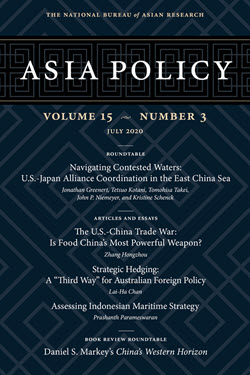Assessing Indonesian Maritime Strategy
Current Evolution and Future Prospects
This essay examines the evolution of Indonesia’s maritime strategy—in particular, the approach adopted under President Joko “Jokowi” Widodo known as the Global Maritime Fulcrum (GMF)—and assesses the implications for the country’s strategic thinking in the future.
Executive Summary
MAIN ARGUMENT
Though the GMF is a key inflection point in the evolution of Indonesian maritime strategy and made some progress during Jokowi’s first term, several key opportunities were not realized and the strategy faced severe shortcomings in the way it was defined, messaged, resourced, coordinated, and institutionalized. To fully achieve the potential of Indonesia’s maritime strategy, the Indonesian government will have to take a series of measures at home and abroad, both on its own and in concert with other regional and global actors, to address lingering challenges and seize new opportunities during Jokowi’s second term and beyond. Using interviews with key figures, primary and secondary sources, and an original analytical framework, this essay comprehensively assesses Indonesia’s maritime strategy under Jokowi and specifies ways in which the government can manage existing challenges and further advance its maritime strategy in the Indo-Pacific region over the coming years.
POLICY IMPLICATIONS
- Given the significance of the GMF as an inflection point in Indonesia’s wider thinking on maritime issues, the Indonesian government needs to urgently address uncertainty about the GMF’s future by reinforcing the clarity of its messaging and increasing policy coordination among government agencies.
- Beyond rhetoric, Indonesia should focus on strategically and sustainably shoring up its maritime capabilities, including building up the country’s resource base and strengthening its capacities at sea.
- Even if Indonesia’s maritime strategy remains focused on domestic and development issues for the foreseeable future, Jakarta can work toward a comprehensive maritime approach by building out the foreign policy aspects of it, including through work in regional and global institutions.
- Apart from what Indonesia can do itself, the country could also integrate aspects of its maritime approach with those of other Indo-Pacific and global partners, including the U.S., Japan, India, and Australia.
Prashanth Parameswaran is a Fellow with the Asia Program at the Woodrow Wilson International Center for Scholars in Washington, D.C. (United States). He holds an MA and PhD in international affairs from Tufts University.
About Asia Policy
Asia Policy is a peer-reviewed scholarly journal presenting policy-relevant academic research on the Asia-Pacific that draws clear and concise conclusions useful to today’s policymakers. Asia Policy is published quarterly in January, April, July, and October and accepts submissions on a rolling basis. Learn more


